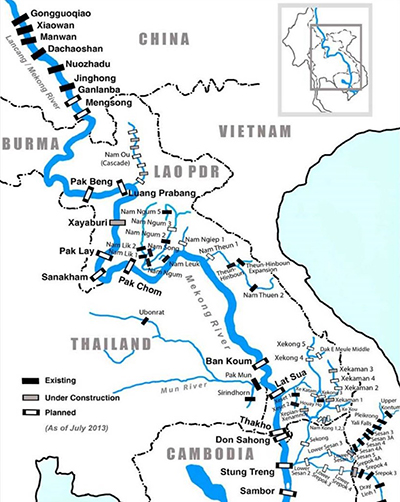Interview with Brian Eyler
August 12, 2016
Listen to the full interview between Dan Southerland (L) and Brian Eyler (R)
The Mekong River crosses six countries and supports as many as 70 million people living both in subsistence economies and in modern cities. Yet little investigative reporting has been done on the impact of dam building along the river’s mainstream and its tributaries.
 Map of current and upcoming dams in the Mekong region
With the goal of becoming “the battery of Southeast Asia,”
landlocked and impoverished Laos, for example, has permitted the
construction of nearly nine dams on the Mekong and its tributaries.
Most dam projects are commercial opportunities for developers. But
will the country itself be able to operate the dams when the
concessions expire? Brian Eyler, director of Southeast Asia programs
at the Washington-based Stimson Center, doubts it.
Map of current and upcoming dams in the Mekong region
With the goal of becoming “the battery of Southeast Asia,”
landlocked and impoverished Laos, for example, has permitted the
construction of nearly nine dams on the Mekong and its tributaries.
Most dam projects are commercial opportunities for developers. But
will the country itself be able to operate the dams when the
concessions expire? Brian Eyler, director of Southeast Asia programs
at the Washington-based Stimson Center, doubts it.
Here, Eyler speaks to RFA’s executive editor, Dan Southerland, about the devastating impact of dam building on the Mekong River and its impact on the migration of fish.
Fish are the primary source of protein for farmers and fishermen living near the Mekong. In both the Lao and Thai languages, they speak of the Mekong as “Mother River.” They rely on the river for transportation, irrigation, and perhaps most important for the fish.
The dams block the migration of fish, raising the risk of malnutrition, which is now widespread among young children in the region.
Eyler is an expert on transboundary issues in the Mekong region and analyzes the shared interests and challenges emerging in China's economic relations with Southeast Asia. He is also the author of The Last Days of the Mighty Mekong, to be published by Zed Books in 2017.
“All it takes is one season, one dam, and the migration of fish is gone forever.”
The 30-minute-long interview highlights deep contradictions between the stated goals of governments, which are eager to reduce poverty and provide growth for their countries, and the get-rich mentality of large banks and developers.
"It’s Southeast Asia,” says Eyler. “Who you know matters, and what you have behind you matters. Not the rule of law,” he says. “Not what’s down on paper.”
Forgotten in the rush to produce hydropower is a fragile ecosystem that supports subsistence economies and millions of people.
Dam building then appears as a large part of a development strategy gone wrong.